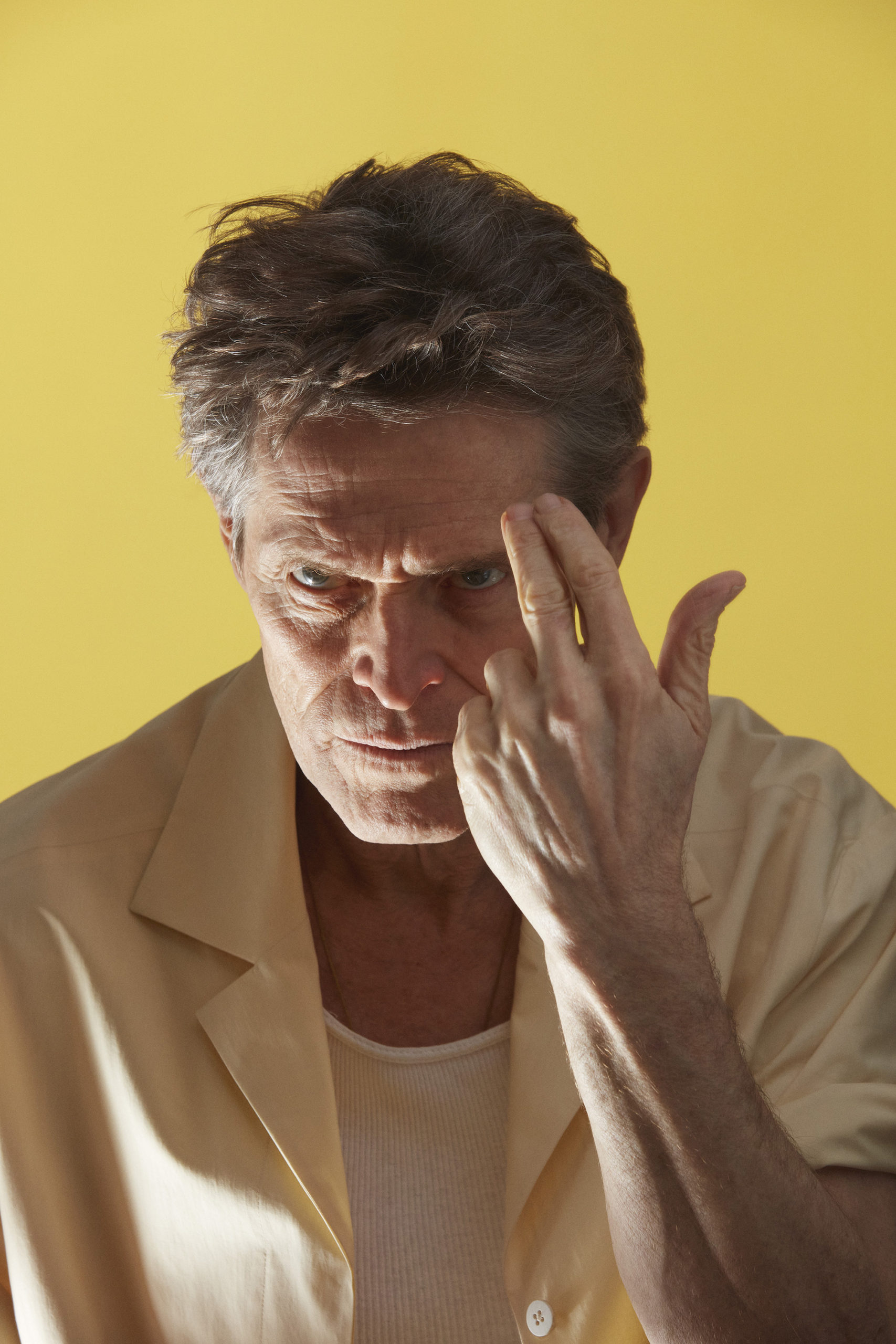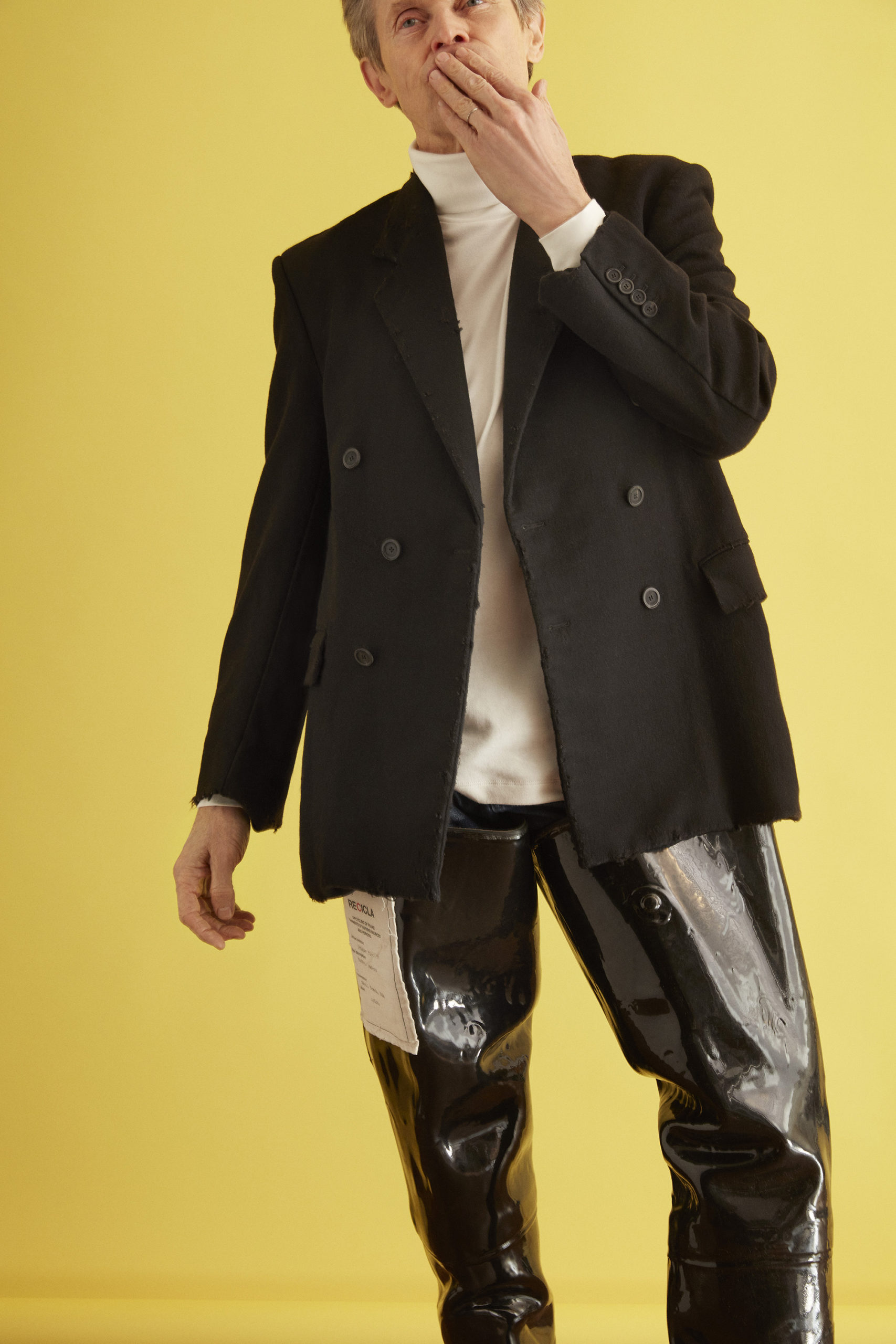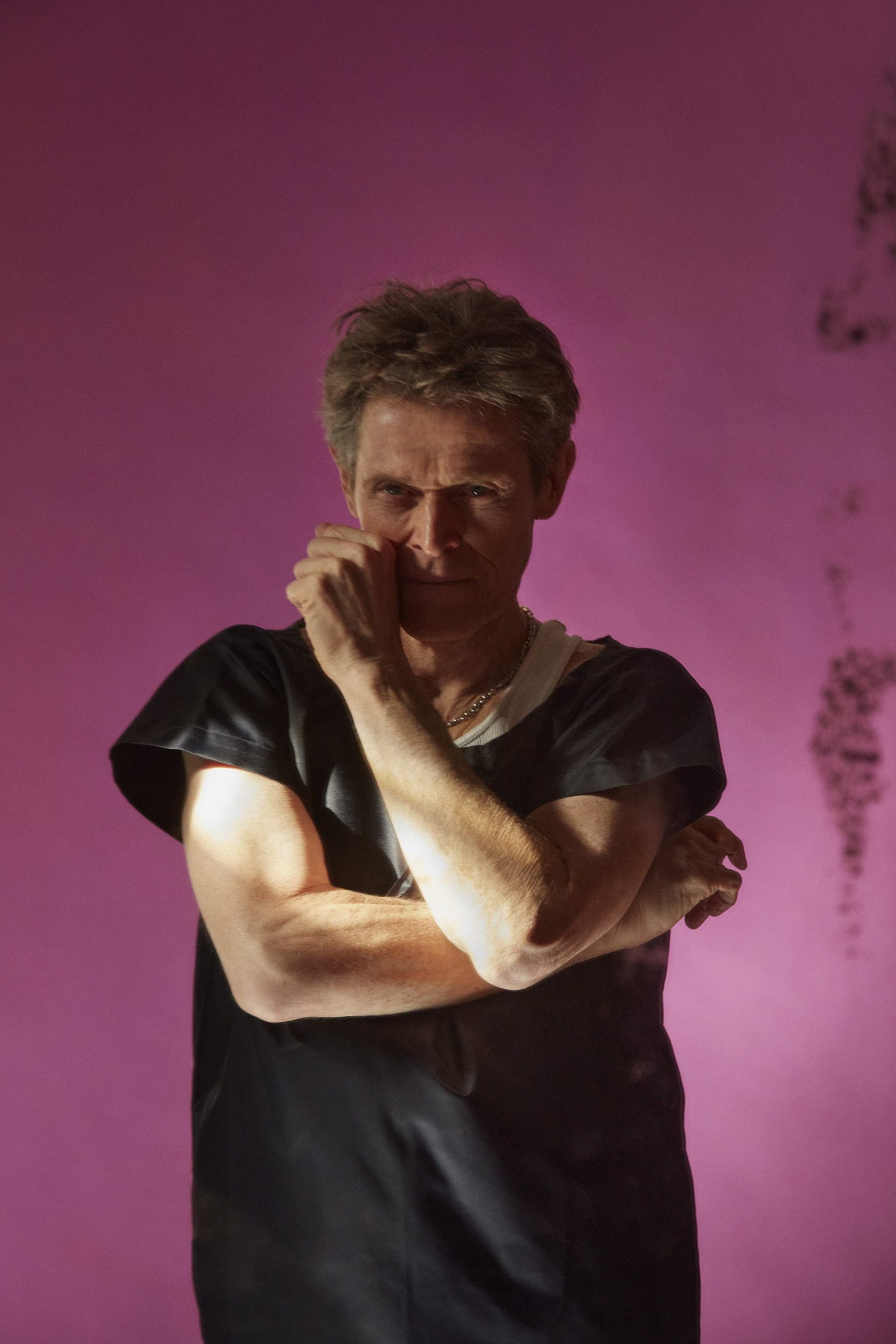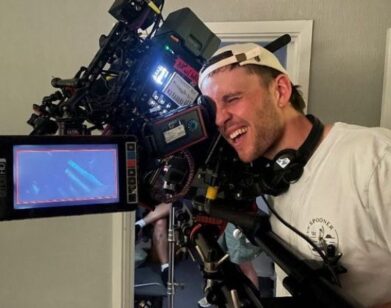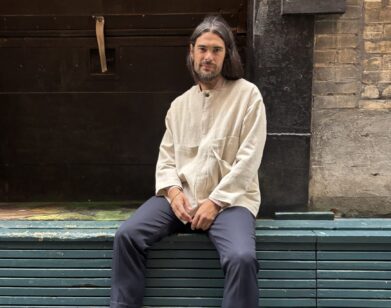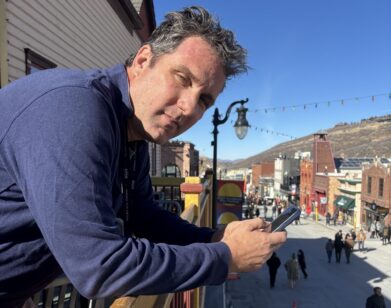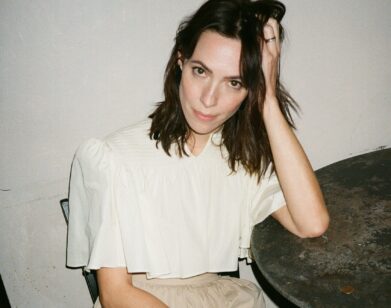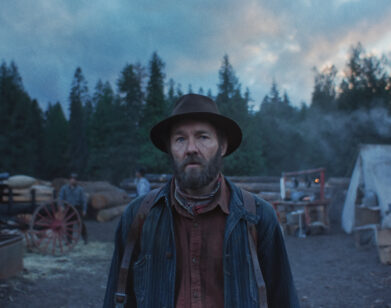icon
What Does Willem Dafoe Desire? Mark Ruffalo Finds Out
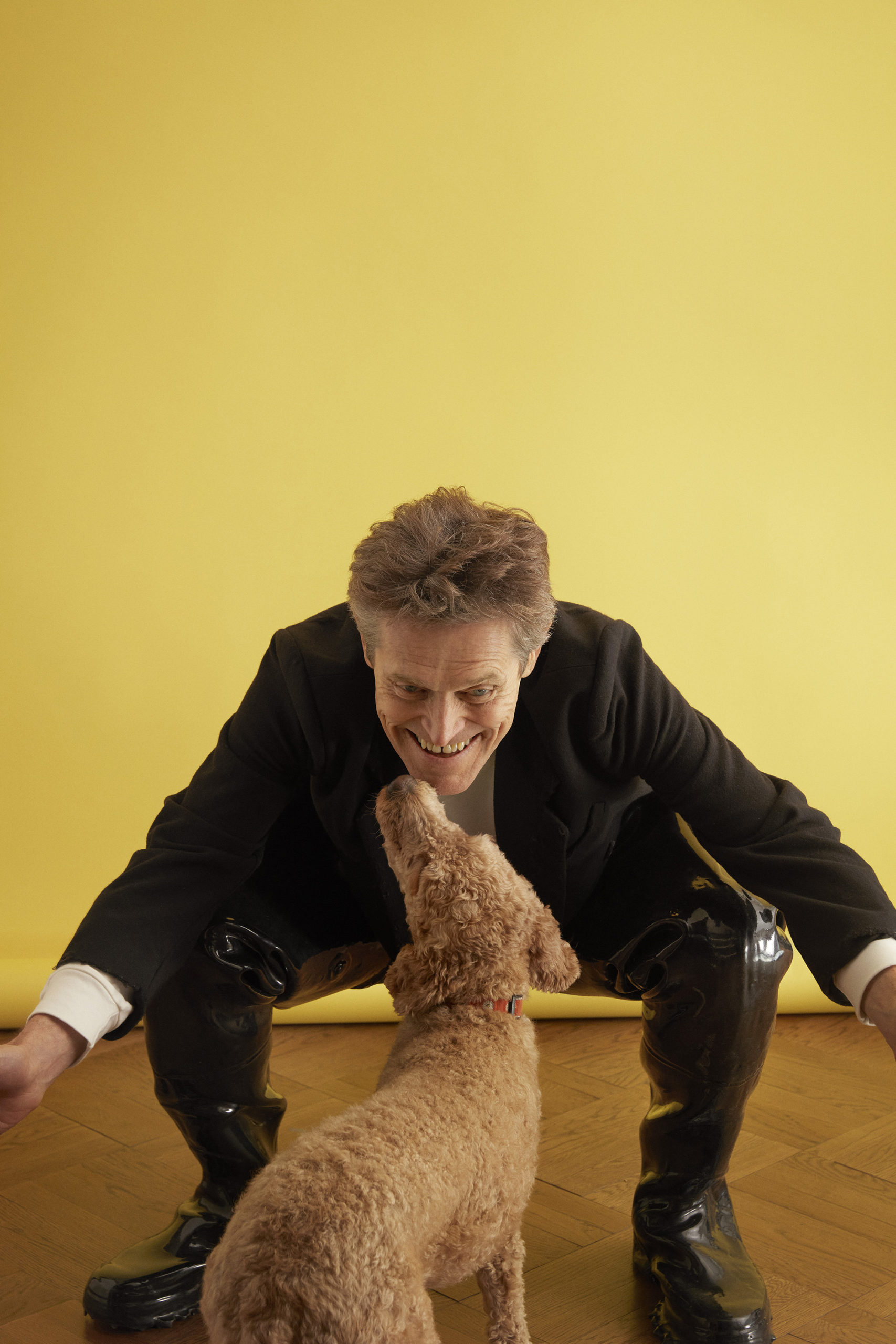
Blazer and Pants (worn throughout) by Balenciaga. Turtleneck (worn throughout) by Uniqlo. Shoes by Maison Margiela.
Willem Dafoe’s face can work wonders. Depending on the angle and the light, the 66-year-old actor can resemble an ancient Greek statue or a gremlin guarding the underside of a bridge. That range, which begins on his face and extends into his soul, can be traced through a more-than–four-decade career that began in New York’s experimental theater scene and has swung between classical movie stardom and arthouse extremity. He’s brought gravitas to superhero blockbusters like Spider-Man: No Way Home and Aquaman, and menace to auteurist exercises like David Lynch’s Wild at Heart and Lars von Trier’s Antichrist. In The Florida Project, he gave a naturalistic performance as a kind-hearted janitor that may have been the best of his storied career. Next up, the four-time Oscar nominee heads to tenth-century Iceland in The Northman, a ferocious Viking saga that reunites him with The Lighthouse director Robert Eggers. And although this marks his seventh feature-film role in the last year and a half, Dafoe doesn’t see any of it as work. As he tells his friend Mark Ruffalo, it’s a service. —CHARLES BRAMESCO
———
MARK RUFFALO: How you doin’?
WILLEM DAFOE: I’m doing great. What’s the beard for? Life?
RUFFALO: Yeah. Just letting it go.
DAFOE: I like being clean-shaven.
RUFFALO: [Laughs] I gotta interview you.
DAFOE: I know.
RUFFALO: Man, you’ve done 129 movies. The one thing that really jumped out at me was how many directors you’ve worked with multiple times. That doesn’t happen a lot. You have Robert Eggers, Marty Scorsese, Paul Schrader, Wes Anderson, Abel Ferrara, Lars von Trier, Julian Schnabel, Andrew Stanton, Oliver Stone, and Giada Colagrande [Dafoe’s wife], and I’m probably missing a few. Why do you think that is?
DAFOE: It’s a combination of things. When there’s a director who I like a lot, I want to be part of their work. Sometimes I make myself available, even if it’s a smaller role. Once I work with someone and I enjoy it, it’s nice to go back because you’ve got trust. I like to go towards directors that have a very particular point of view. If you really want to have a transparent adventure that an audience can dig, then you want to be with people that turn you on. And so, you go back.
RUFFALO: It’s beautiful.
DAFOE: All of those relationships are very different. Some of them I know quite well. Some of them I don’t know at all personally, but I like working with them. There’s no pattern. The only thing is, when I look at projects, the director’s very important.
RUFFALO: Clearly. Even now. You worked with Robert Eggers twice, back to back.
DAFOE: I’m a total cheerleader for him. In The Northman, my role is less expressive than in The Lighthouse. But still, he’s great. It’s a curious thing for a guy to make smaller films and then go to a very big film. Sometimes they can fall on their face. And even though I haven’t seen The Northman, I was impressed by how he approached the material with the same kind of care.
RUFFALO: You showed me a little video one night of a dance that you did as Heimir the Fool. You play the fool, right?
DAFOE: I play a jester. I worked with a choreographer, and we came up with a little dance that was a presentation at one of the banquets in the story. We showed it to him and he was like, “Ah, cool. But no, that’s not it.” You know that feeling.
RUFFALO: Are you kidding me? I’ve had whole scenes not make it in the movie because they weren’t “it.”
DAFOE: In The Last Temptation of Christ we had a key scene, and it was quite emotional. I had a swing at it. We were in a pretty good rhythm, and then Martin Scorsese came up to me and said, “Ah, kid, that’s not it.”
RUFFALO: Oh my god.
DAFOE: We just banged away, and we tried it again.
RUFFALO: How many movies did you make in just the last year and a half?
DAFOE: It’s been crazy. I don’t know how many. Maybe eight? But keep in mind, some of them are smaller roles.
RUFFALO: Yes.
DAFOE: Like working with Wes [Anderson in The French Dispatch], we’re talking about a true cameo. There was one film that I’m quite excited about, that involves a first-time feature director, a Greek guy [Vasilis Katsoupis]. I’m basically the only actor in the movie. That was two and a half months. After the initial lockdown, I ran to Rome, because I was afraid that Donald Trump would close the borders and I wouldn’t be able to see my wife. Everyone said, “What a bad idea, Italy’s really in trouble.” But the truth is, I got there and things were very regional. Rome was quite chill. People, more or less, were following protocols. So I chilled there for a little while, and enjoyed the time to be with my wife and do nothing. Around July I started again. The things that got put on hold banged up against the things that were planned. I was lucky that people, in the spirit of co-operation, scheduled it in such a way that I could pretty much go from project to project. Normally I don’t like to do that, because you don’t want to get too ahead of yourself. But I will say that this was a really good run. We’ll see how it all spills out. Now, I’m gonna take a break. Then soon, I’ll start all over again. Which is what any actor does. I’m just one of those guys. I’m sorry. I’m a little ashamed.
RUFFALO: Why would you be ashamed?
DAFOE: “Get a life,” you know?
RUFFALO: You have a life.
DAFOE: My life happens through the work, and there’s not much separation. It’s always been that way. I’m close with people I work with. One thing shakes the tail of the other, or whatever the expression is.
RUFFALO: Where does that work ethic come from? We both come from Wisconsin. Do you think that’s part of it?
DAFOE: That’s a big part of it. I don’t blame my parents for anything. The work ethic that I have is a good thing. It’s given me a lot of pleasure, but it definitely comes from them. My father’s whole identity was in his work, as well as my mother’s. There’s something about making things that gives you energy. Probably the scariest thing is a complacency or a kind of deep, deep depression about what your job is, what you’re here for. Somehow when you’re in a community of people making something, you feel useful, like you’re the storyteller in front of the campfire. You’re doing a service.
RUFFALO: What is that service?
DAFOE: That service is playing up these stories. You’re putting yourself in a situation where you’re having an experience, and hopefully it’s transparent and truthful enough that people can go with you and have that experience, too. It’s a privileged position. It makes me think of [Pier Paolo] Pasolini, who made a very beautiful documentary in the ’60s where he went around Italy and interviewed all kinds of people about sex. It wasn’t lurid at all, it was very straightforward and direct. I think you can see it on YouTube, Comizi d’Amore. The thing that struck me is that people don’t know how they feel about sex. They take their sexuality from society, or things outside of them, and then they try it on for size. It’s not just about sexuality, it’s about how people live. They learn from watching stuff outside of themselves.
RUFFALO: Right.
DAFOE: It’s very hard to know yourself. It takes a lot of training. Life is so hectic that people don’t get that reflective time. We’re forced to get out there and forge an identity and be productive.
RUFFALO: Right. Your choice of roles, Willem, are so vast. They can go from extreme to extreme. I just saw Tommaso.
DAFOE: That’s basically an improvised movie, huh?
RUFFALO: Yes, it’s an amazing piece of filmmaking, and you’re great in it. It’s something different than what we’d normally see you do. But you chose that, and you chose The Northman, and you chose Nightmare Alley.
DAFOE: I try to mix it up. Something like Tommaso happens because I’ve cultivated a relationship with Abel Ferrara, the director. I’ve made many movies with him, and we could only make Tommaso because of that relationship. We’re very loose, and there’s a lot of trust there. In some ways, we’re very different people. But we meet, in cinema terms, in many places. If you liked it, that was probably an expression of a friendship between two people that knew each other’s lives. Because it’s semi-autobiographical for him. There’s a little bit of me thrown in there, too.
RUFFALO: It was funny because you said you were going to go and do nothing. But doing nothing is you getting up in the morning and practicing your yoga. You’re constantly reading, and you’re constantly talking to directors, old and new. Then you have your animals. And then you have your wife, Giada.
DAFOE: She has me. [Laughs]
RUFFALO: She has you. And that’s no easy feat.
DAFOE: Listen, I could only do what I do because she is the same way about work. She’s always doing stuff, so we’re always next to each other. Together and apart. And occasionally we actually work together. We’re both very busy. It’s not that classic thing of a headliner and the support person.
RUFFALO: Clearly not.
DAFOE: She’s busier than I am, as far as actually working. That’s a nice setup. And I admire her for the way she is very skilled at many things. She gets curious about something, then, boom, she goes for it. I’ve seen her teach herself so many things over the years, and it’s always an inspiration to me. Because a lot of times when you do a role, you gotta learn a craft, or you gotta learn an accent, or a way of doing things—how to make shoes, how to paint, how to sing, how to dance. There’s always something.
RUFFALO: What is your feeling about ambition?
DAFOE: It can kill ya [Laughs]. I’ve heard from people who’ve interviewed old friends of mine that say, “Willem always wanted to be a movie star.” I want to strangle them! It’s not fucking true. But I noticed that I’ve heard it enough that I must have projected something that gave them that impression.
RUFFALO: Sure.
DAFOE: The target’s always moving. So you gotta be kind, and have a good sense of humor about where you’re going. I think ambition, in our society, depends on stepping on people. That’s what we’re taught.
RUFFALO: That’s what you equate to it.
DAFOE: Maybe it’s just a word. But people I know who are really ambitious, they push you away. You feel their selfishness, and you don’t want to be with them. They’re not cool—at least that’s the way I feel. Performers that I am attracted to, you don’t feel their neediness. You feel like they’re surrendering to something outside of themselves. But sometimes very skilled people want to show what they can do— that an appreciation of that is gonna bring them forward and that’s going to make them more desirable, more famous. I get it. But that’s not what I’m attracted to.
RUFFALO: You don’t do 129 movies and work like you do without someone saying, “That’s ambition.” It’s the distinction of what drives you, Willem, what drives that love of the work, and desire to keep doing it.
DAFOE: I’m social. I love people. I like being in a group, making something. Maybe it’s coming from a big family, I don’t know. When we were kids, if we had to clean the house, we’d all get together and, this sounds too cute, but this is the root of this shit—we’d get together and someone would pretend it was a televised thing. They’d give a play by play, and we were called The McDafoes. “Now Diane is cleanin’ the counter, and she’s really doin’ a great job.” Everything turned into a game.
RUFFALO: That’s amazing.
DAFOE: That’s how things worked at my house.
RUFFALO: Could you do a nine-to-five, where you have to do the same thing over and over again?
DAFOE: I think I could, because there’s also a part of me that likes routine.
RUFFALO: You do. I was living under you in Budapest and I’d hear you getting up at 4:30 every morning to do your yoga above me.
DAFOE: Sorry! What did you hear, grunting?
RUFFALO: No, I’d hear banging.
DAFOE: Jump-backs. Maybe I’m getting old, not so light on my feet.
RUFFALO: No way. You’re so playful in the way you work. We did talk about working with coaches, and doing all this preparation before you come into something.
DAFOE: I’ve never worked with a coach. I was a little surprised that you did.
RUFFALO: I know.
DAFOE: The stuff that shaped me was anti-established, anti-polished kind of performance. It wasn’t about being a professional actor, it was about fucking around. There was a real love for a kind of roughness and directness, the kind of amateur aesthetic that I grew up with when I first hit New York. I think a little bit of that stayed with me. To be like a child, not to refine it too much because that kind of—
RUFFALO: Kills it.
DAFOE: Refinement sometimes breaks things down, and becomes a show of your prowess. But there’s something to be said for controlling. Performing is always about those two extremes, the control and the abandon. I don’t think people know a lot about what goes into performance. It’s so subjective. One man’s over-the-top, crazy performance is another man’s committed performance. Another person’s natural, rooted performance is another person’s walk-through, lazy performance. You just gotta dress yourself and serve the director, and serve the world that you’re in.
RUFFALO: Where does the magic happen?
DAFOE: Magic happens in people’s heads. Yes, there’s intention, and yes, the directors and the producers have an idea about what they’re trying to convey, but as an actor, I think you have to be a little wilder than that. That’s why it’s so nice that I’m old-fashioned, that I like that theater experience of having a bunch of people in a dark room together with strangers. It’s very important because the way you create the story is different than if you’re sitting at home. You can stop the movie, you can take a phone call, you can eat, you can—
RUFFALO: Text.
DAFOE: Get drunk. [Laughs] Whatever!
RUFFALO: Do you miss the theater?
DAFOE: I do! The last time I performed in the theater proper was maybe four years ago. Since I left the Wooster Group, a company that I was with for 27 years, it was very hard to get excited about other projects. That was a group that made their own work. It was a life. Occasionally, I get tempted. I think, “Wow, if I found a really beautiful, original play, I’d be interested.”
RUFFALO: Is there anything that you want to do that you haven’t done yet?
DAFOE: That’s so hypothetical. I never know.
RUFFALO: I know. That’s a horrible question.
DAFOE: It’s not a horrible question. It doesn’t have a good answer, that’s all.
RUFFALO: It’s a question I’m asked, and I always hate it. I never know what to say.
DAFOE: And you just asked it. I’m not publicity averse. I do things to try to get people to movies. But interviews are tough. Now, Interview interviews are supposed to be a loose conversation. But that’s even tougher. We’re supposed to be talking about what we had for dinner. Humanize these two, full-of-themselves actors.
RUFFALO: Out of everyone I’ve ever been to dinner with—
DAFOE: Uh-oh! [Laughs]
RUFFALO: I’ve never seen more people come up to an actor. But you also have this beautiful equanimity about you. You’re very generous. And you play a lot of bad guys. I can see how people might feel like, “Oh, I don’t know. Is he going to be prickly?” But you’re just so generous and kind. I’ve heard you talk a little bit about how there’s a spiritual dimension to how you interact with the world.
DAFOE: That sounds good. [Laughs]
RUFFALO: I don’t want to betray that in you, but I sense that you’re still working on yourself. You’re not like one of those guys who’s like, “Fuck it. I’m here.” You’re not there. DAFOE: I love that. “I’m not there.” That makes sense to me. Because, I’m not there, I’m everywhere, and nowhere. What can I say? I think people would be surprised at the thing you said about being recognized. But also, we were in Budapest when I was with you. I’m probably better known abroad than I am in the States.
RUFFALO: Why is that?
DAFOE: Given the kind of movies I do. Something like Tommaso barely gets a release in the States but in certain places it competes with Hollywood movies.
RUFFALO: But you have an equanimity about yourself, about your work. You’re not like, “I’m just gonna do big movies. I’m just gonna get paydays.” You’re like this journeyman artist, and it’s beautiful.
DAFOE: I like that. I don’t want to be a burden, and I don’t want to be embarrassed.
RUFFALO: I think that is the perfect motto for a life.
DAFOE: [Laughs] No, it’s a saying that comes from the heart, but it’s also a mixed signal.
RUFFALO: Well, that’s Willem Dafoe.
———
Grooming: Amy Komorowski at The Wall Group
Lighting Designer: Christian Larson
Digital Technician: Jonathan Nesteruk
Fashion Assistants: Theodora Barclay VH and Devante Rollins

